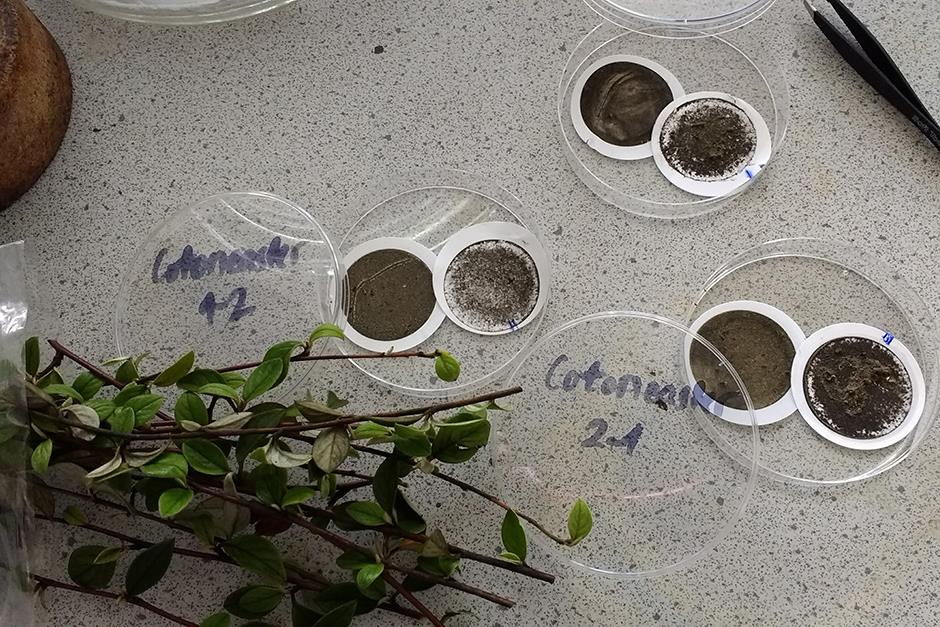The humble Cotoneaster franchetii is the best shrub for cleaning air polluted by car exhausts
 Scientists report that the bushy, hairy-leafed Cotoneaster franchetii is the latest ‘super plant’ to help boost the environment and improve human health because of its special ability to fight pollution by trapping harmful airborne particles.
Scientists report that the bushy, hairy-leafed Cotoneaster franchetii is the latest ‘super plant’ to help boost the environment and improve human health because of its special ability to fight pollution by trapping harmful airborne particles.
A new RHS science paper that looks at the effectiveness of hedges as air pollution barriers reveals that in traffic hotspots, the Cotoneaster franchetii (Franchet’s cotoneaster) is at least 20% more effective at soaking up pollution compared to other shrubs.
Poor air quality has been declared the largest environmental risk to UK public health and according to a recent RHS commissioned survey of 2,056 adults, air pollution affects one in three people (33%) in the UK.
However, only 6% take active steps in the garden to help alleviate it. In London, nearly six in 10 (59%) are affected by air pollution and almost a quarter (22%) of Londoners are ‘significantly affected’ but only 4% plant with pollution in mind.
 Dr Tijana Blanusa , research lead for the paper and RHS Principal Horticultural Scientist, said: “On major city roads with heavy traffic we’ve found that the species with more complex denser canopies, rough and hairy-leaves such as cotoneaster were the most effective.
Dr Tijana Blanusa , research lead for the paper and RHS Principal Horticultural Scientist, said: “On major city roads with heavy traffic we’ve found that the species with more complex denser canopies, rough and hairy-leaves such as cotoneaster were the most effective.
“We know that in just seven days a one metre length of well-managed dense hedge will mop up the same amount of pollution that a car emits over a 500 mile drive.
“We estimate the Cotoneaster franchetii traps 20% more emissions than other hedges we have tested so would be ideal along busy roads in pollution hot spots. For other areas where encouraging biodiversity and pollinators is key, a mix of different hedge species would be recommended.”

Hedges, shrubs and trees provide the greatest long-term benefits for the environment and for wildlife. According to the survey, carried out by YouGov, four in 10 (38%) gardens contain at least one hedge.
Six in 10 people (61%) report to have at least one tree in their garden and this increases to around two thirds of all gardens in the East of England (65%), East Midlands (65%), West Midlands (64%) and South West (68%).
‘Super plants’ to mitigate climate change
In the last 10 years, our scientists have intensified their research to find solutions to help ease environmental problems such as air pollution, heatwaves and localised flooding in order to amplify the positive impact of gardens and green spaces on the environment.
Nearly nine in 10 (86%) survey respondents said they care about environmental issues and 78% say they worry about the impact of climate change. Seven in 10 (70%) take positive action to help the environment and 20% say they do as much as possible to help.
 We hope to harness people’s enthusiasm and willingness to take action to improve the environment and mitigate against climate change by encouraging a more considered approach in gardens which is informed by the latest science.
We hope to harness people’s enthusiasm and willingness to take action to improve the environment and mitigate against climate change by encouraging a more considered approach in gardens which is informed by the latest science.
Heatwaves ‘moderately’ or ‘severely’ affect nearly four in 10 respondents (38%) and with Londoners, this increases to 56%. Flooding impacts more than one in 10 nationally (13%) with regions affected the worst including Yorkshire (20%) and the West Midlands (18%).
Professor Alistair Griffiths, RHS Director of Science and Collections, said: “RHS science has shown that underlying traits of certain plant species and cultivars, such as leaf shape and root features, help alleviate numerous environmental issues.
 “We are continually identifying new ‘super plants’ with unique qualities which when combined with other vegetation provide enhanced benefits while providing much needed habitats for wildlife.
“We are continually identifying new ‘super plants’ with unique qualities which when combined with other vegetation provide enhanced benefits while providing much needed habitats for wildlife.
“We’ve found for example that ivy wall-cover excels at cooling buildings and hawthorn and privet help ease intense summer rainfalls and reduce localised flooding.
“If planted in gardens and green spaces where these environmental issues are most prevalent we could make a big difference in mitigating against and adapting to climate change.”
Our scientists are now moving into RHS Hilltop – The Home of Gardening Science, based at RHS Garden Wisley in Surrey. The centre contains state-of-the-art lab facilities which will enable the scientists to increase their research capabilities in these areas.

RHS Hilltop, which opens on Thursday, 24 June 2021, will include a large exhibition space and be surrounded by four acres of ‘living laboratories’ featuring ideas reflecting the latest science for visitors and school children to take away and incorporate at home, in schools and in communities.
Prof Griffiths added: “We are working on multiple new projects that will unlock the true potential of gardens and garden plants. We hope to harness the power of the UK’s 30 million gardeners to help turbocharge the fight against climate change and biodiversity loss.”
Read more

